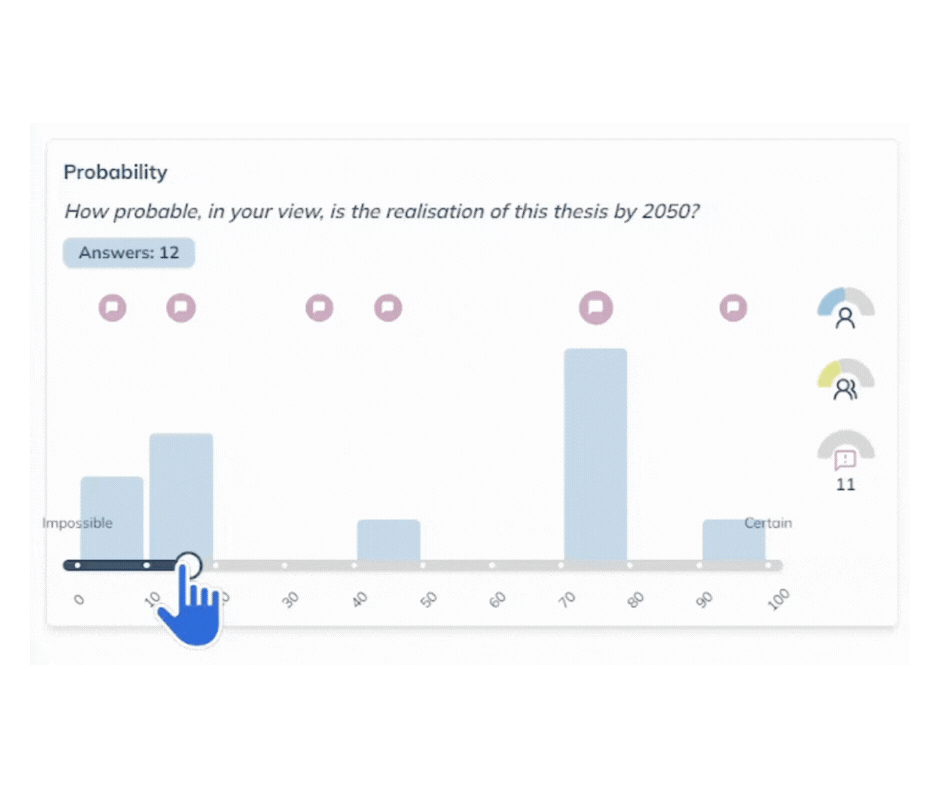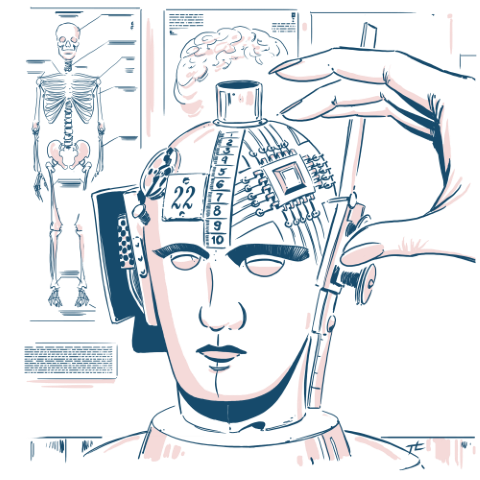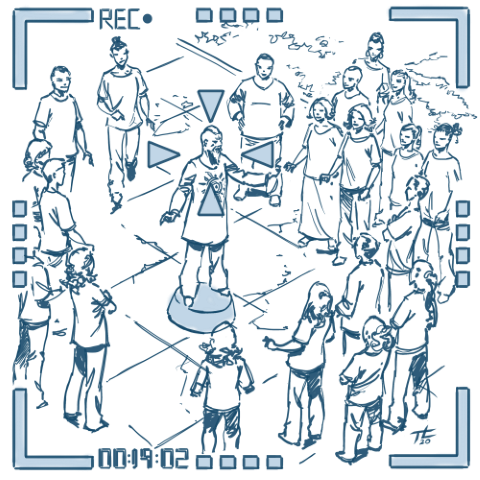Delphi: The surprising method essential for navigating the AI revolution

We stand at the dawn of an era increasingly defined by Artificial Intelligence. AI promises unprecedented efficiency, insight, and transformation across nearly every field. Yet, amidst the accelerating capabilities of machines, a profound paradox emerges: the more powerful AI becomes, the more critical robust human judgment, value alignment, and collective understanding become.
As algorithms generate options and analyses at scale, the fundamental questions of what is desirable, what future we want to build, and how we navigate complex ethical terrain remain resolutely human. It is precisely in this context that the Delphi method, particularly its advanced, next-generation form, unexpectedly rises not just in relevance, but in urgent necessity – offering a path beyond both superficial collective intelligence derived from flawed processes and the purely artificial intelligence of machines, towards genuine, shared human wisdom.

The AI amplification effect: more information, more need for human consensus
AI excels at processing vast datasets, identifying patterns, and generating potential solutions or arguments far exceeding human capacity in speed and scope. However, this very power amplifies the need for structured human deliberation:
![]() Navigating the information deluge: AI can present numerous options or complex analyses, but humans must interpret this output, assess its validity, understand its limitations, and decide which paths align with our goals and values. Raw information, even AI-generated, isn’t wisdom; it requires human contextualization.
Navigating the information deluge: AI can present numerous options or complex analyses, but humans must interpret this output, assess its validity, understand its limitations, and decide which paths align with our goals and values. Raw information, even AI-generated, isn’t wisdom; it requires human contextualization.
![]() Bridging the “decision gap”: AI operates on logic and data; it doesn’t possess inherent ethics, societal understanding, or a grasp of human desirability. Crucial decisions—about policy, societal futures, ethical boundaries in AI deployment—require normative judgments that only humans, in dialogue with each other, can make.
Bridging the “decision gap”: AI operates on logic and data; it doesn’t possess inherent ethics, societal understanding, or a grasp of human desirability. Crucial decisions—about policy, societal futures, ethical boundaries in AI deployment—require normative judgments that only humans, in dialogue with each other, can make.
![]() Counteracting algorithmic bias and echo chambers: AI systems learn from data, which can embed existing societal biases. They can also create sophisticated echo chambers, reinforcing certain viewpoints. Structured human interaction, designed to surface diverse perspectives and challenge assumptions (as Delphi facilitates), is vital to identify and mitigate these risks, ensuring we don’t mistake artificial confidence for accuracy.
Counteracting algorithmic bias and echo chambers: AI systems learn from data, which can embed existing societal biases. They can also create sophisticated echo chambers, reinforcing certain viewpoints. Structured human interaction, designed to surface diverse perspectives and challenge assumptions (as Delphi facilitates), is vital to identify and mitigate these risks, ensuring we don’t mistake artificial confidence for accuracy.
![]() Addressing AI’s reliance on past patterns: AI models learn by identifying patterns within vast datasets reflecting past events and behaviors, including societal biases and blind spots. Consequently, they inherently capture and can even amplify the biases present in that historical data. Furthermore, their ability to anticipate truly novel future conditions, evolving human values, paradigm shifts or emergent ethical challenges not represented in past data is limited. This necessitates humans engaging in forward-looking deliberation to define desirable futures, navigate emerging ethical landscapes, and consciously steer progress beyond the trajectory suggested solely by past patterns – a task requiring collective foresight and value clarification, which Delphi is well-suited to support.
Addressing AI’s reliance on past patterns: AI models learn by identifying patterns within vast datasets reflecting past events and behaviors, including societal biases and blind spots. Consequently, they inherently capture and can even amplify the biases present in that historical data. Furthermore, their ability to anticipate truly novel future conditions, evolving human values, paradigm shifts or emergent ethical challenges not represented in past data is limited. This necessitates humans engaging in forward-looking deliberation to define desirable futures, navigate emerging ethical landscapes, and consciously steer progress beyond the trajectory suggested solely by past patterns – a task requiring collective foresight and value clarification, which Delphi is well-suited to support.
![]() Highlighting human-AI synergy: While AI can, and increasingly does, automate or replace human input for simpler, routine, data-driven decisions, it is poised to augment, not replace, critical human decision-making. For value-laden decisions fraught with ambiguity or significant consequence, relying solely on AI would be irresponsible. True value emerges from synergy: AI handles the scale of data analysis and pattern identification, while humans provide strategic direction, contextual understanding, ethical grounding, and final judgment. Structured processes like Delphi are essential to effectively manage this synergy, ensuring human wisdom guides the application of artificial power, allowing us to engage in robust deliberation to interpret AI’s suggestions, debate implications, and arrive at wise, context-aware decisions.
Highlighting human-AI synergy: While AI can, and increasingly does, automate or replace human input for simpler, routine, data-driven decisions, it is poised to augment, not replace, critical human decision-making. For value-laden decisions fraught with ambiguity or significant consequence, relying solely on AI would be irresponsible. True value emerges from synergy: AI handles the scale of data analysis and pattern identification, while humans provide strategic direction, contextual understanding, ethical grounding, and final judgment. Structured processes like Delphi are essential to effectively manage this synergy, ensuring human wisdom guides the application of artificial power, allowing us to engage in robust deliberation to interpret AI’s suggestions, debate implications, and arrive at wise, context-aware decisions.
![]() Confronting transparency challenges: While advancements like chain-of-thought prompting allow many AI models to generate intermediate steps resembling reasoning, the complex internal workings of many sophisticated systems still remain fundamentally opaque – often referred to as the “black box” problem. Even when reasoning steps are shown, they are outputs themselves and don’t guarantee full insight into the model’s internal state or freedom from bias. This persistent lack of deep transparency poses significant challenges for trust, accountability, and validation. Human deliberation, facilitated by methods like Delphi, therefore remains crucial for critically scrutinizing AI outputs, questioning underlying assumptions, integrating external knowledge, and building justifiable confidence in decisions informed by these powerful, yet not fully interpretable, tools, especially in high-stakes domains.
Confronting transparency challenges: While advancements like chain-of-thought prompting allow many AI models to generate intermediate steps resembling reasoning, the complex internal workings of many sophisticated systems still remain fundamentally opaque – often referred to as the “black box” problem. Even when reasoning steps are shown, they are outputs themselves and don’t guarantee full insight into the model’s internal state or freedom from bias. This persistent lack of deep transparency poses significant challenges for trust, accountability, and validation. Human deliberation, facilitated by methods like Delphi, therefore remains crucial for critically scrutinizing AI outputs, questioning underlying assumptions, integrating external knowledge, and building justifiable confidence in decisions informed by these powerful, yet not fully interpretable, tools, especially in high-stakes domains.
![]() Building shared understanding for responsible use: Implementing AI solutions effectively and ethically requires buy-in and shared understanding among stakeholders. We need consensus not just on what AI tells us, but on how we should responsibly interpret and act upon its insights within our specific human context.
Building shared understanding for responsible use: Implementing AI solutions effectively and ethically requires buy-in and shared understanding among stakeholders. We need consensus not just on what AI tells us, but on how we should responsibly interpret and act upon its insights within our specific human context.

Delphi: a time-tested framework for collective human intelligence
For decades, the Delphi method has provided a powerful, proven framework for exactly this kind of challenge. Its core principles—anonymity to encourage honest input, structured iteration to allow reflection, controlled feedback focusing on reasoning, and the goal of achieving informed consensus—are designed explicitly to harness collective human intelligence. It’s a method built on the premise that structured dialogue, where diverse individuals can learn from each other’s reasoning without the pitfalls of face-to-face group dynamics, leads to more robust and well-considered outcomes. Its success across fields from policy guidelines to medical research and business strategies attests to its enduring value in navigating complexity through human collaboration.
While the original Delphi relied on sequential rounds (Multi-Round Delphi or MRD), this article primarily focuses on its modern evolution: Real-Time Delphi (RTD). Traditional MRD, involving lengthy pauses between rounds for analysis and feedback compilation, is increasingly impractical for the pace of today’s challenges and often suffers from participant fatigue and dropout. RTD addresses these issues through immediate feedback loops, allowing for a more dynamic, engaging, and efficient process where participants see aggregated results and justifications as they emerge. While the core need for deep understanding and robust consensus applies to any Delphi format, RTD provides the more viable and potent mechanism for the complex, often urgent, deliberations required in the age of AI, provided it is implemented on platforms designed for genuine interaction and insight, not just speed.

Why traditional Delphi falls short in the AI age
However, the very challenges amplified by AI expose the limitations of traditional Delphi implementations and the platforms that support them. As discussed previously (check out the article: Delphi died? Far from it, but your platform might be stuck in the past), many existing tools suffer from:
![]() An over-reliance on superficial statistics (like averages) that obscure nuance, leading to superficial collective intelligence rather than deep insight.
An over-reliance on superficial statistics (like averages) that obscure nuance, leading to superficial collective intelligence rather than deep insight.
![]() Clunky interfaces making it difficult and laborious to access and understand the reasoning behind different viewpoints.
Clunky interfaces making it difficult and laborious to access and understand the reasoning behind different viewpoints.
![]() A lack of features for genuine interaction, discussion, or seeing how arguments evolve.
A lack of features for genuine interaction, discussion, or seeing how arguments evolve.
![]() An inability to effectively guide attention or highlight crucial points of disagreement or convergence in reasoning.
An inability to effectively guide attention or highlight crucial points of disagreement or convergence in reasoning.
These shortcomings, problematic even for traditional complex issues, become critical failures when dealing with the multifaceted, rapidly evolving, and often ethically charged dilemmas posed by AI. We need tools capable of facilitating deeper dives into complex arguments, supporting nuanced dialogue about values, and enabling participants to truly grapple with diverse, sometimes AI-influenced, perspectives. Relying on simplistic stats or struggling with cumbersome interfaces yields only shallow agreement, insufficient for the task.

Bridging AI insights and human judgment: Delphi’s role across domains
The need to integrate AI’s analytical power with human wisdom is not abstract; it’s becoming concrete across Real-Time Delphi’s traditional application areas:
![]() Business innovation and strategy: AI might generate novel product concepts, predict market shifts with high accuracy, or optimize supply chains. Yet, translating these possibilities into viable business strategies requires human judgment. Assessing the alignment of AI-suggested innovations with brand values and long-term vision, understanding the complex human factors in market adoption, navigating the risks inherent in strategic pivots, and fostering cross-functional alignment on execution all demand deep discussion and consensus building – tasks where Real-Time Delphi excels at integrating diverse internal expertise beyond the reach of algorithms alone.
Business innovation and strategy: AI might generate novel product concepts, predict market shifts with high accuracy, or optimize supply chains. Yet, translating these possibilities into viable business strategies requires human judgment. Assessing the alignment of AI-suggested innovations with brand values and long-term vision, understanding the complex human factors in market adoption, navigating the risks inherent in strategic pivots, and fostering cross-functional alignment on execution all demand deep discussion and consensus building – tasks where Real-Time Delphi excels at integrating diverse internal expertise beyond the reach of algorithms alone.
![]() Government policy and global strategy: AI offers powerful tools for modeling policy outcomes, simulating complex geopolitical scenarios, or analyzing vast amounts of public data. However, policy-making is inherently a human endeavor involving competing values, diverse stakeholder interests, and ethical trade-offs. Using Delphi allows policymakers and experts to collaboratively scrutinize AI models and their assumptions, debate the societal implications and fairness of AI-informed policies, integrate qualitative insights and diverse cultural perspectives that models might miss, and build the necessary public trust and political consensus for effective governance in an increasingly complex world.
Government policy and global strategy: AI offers powerful tools for modeling policy outcomes, simulating complex geopolitical scenarios, or analyzing vast amounts of public data. However, policy-making is inherently a human endeavor involving competing values, diverse stakeholder interests, and ethical trade-offs. Using Delphi allows policymakers and experts to collaboratively scrutinize AI models and their assumptions, debate the societal implications and fairness of AI-informed policies, integrate qualitative insights and diverse cultural perspectives that models might miss, and build the necessary public trust and political consensus for effective governance in an increasingly complex world.
![]() Medicine and public health: AI can analyze complex clinical trial data or identify subtle diagnostic patterns faster than humans. However, interpreting the clinical significance of these findings, weighing the profound ethical considerations in AI-driven diagnostics or treatment plans, and formulating evidence-based practice guidelines requires nuanced discussion and consensus among diverse medical experts, ethicists, and patient representatives. Delphi provides the structured environment for this critical human layer of interpretation, ensuring AI serves patient well-being and clinical reality.
Medicine and public health: AI can analyze complex clinical trial data or identify subtle diagnostic patterns faster than humans. However, interpreting the clinical significance of these findings, weighing the profound ethical considerations in AI-driven diagnostics or treatment plans, and formulating evidence-based practice guidelines requires nuanced discussion and consensus among diverse medical experts, ethicists, and patient representatives. Delphi provides the structured environment for this critical human layer of interpretation, ensuring AI serves patient well-being and clinical reality.
![]() Research initiatives across disciplines: AI can dramatically accelerate research by processing vast literature, analyzing complex datasets, or generating novel hypotheses in fields ranging from climate science to social sciences and materials engineering. Yet, setting research priorities, interpreting ambiguous or conflicting findings, ensuring ethical conduct (especially with AI tools), and synthesizing knowledge across disciplinary boundaries fundamentally requires human expertise and collaborative judgment. Delphi enables diverse groups of researchers, funders, and stakeholders to collectively shape research agendas, validate AI-generated insights within specific contexts, and build consensus on the direction and interpretation of inquiry.
Research initiatives across disciplines: AI can dramatically accelerate research by processing vast literature, analyzing complex datasets, or generating novel hypotheses in fields ranging from climate science to social sciences and materials engineering. Yet, setting research priorities, interpreting ambiguous or conflicting findings, ensuring ethical conduct (especially with AI tools), and synthesizing knowledge across disciplinary boundaries fundamentally requires human expertise and collaborative judgment. Delphi enables diverse groups of researchers, funders, and stakeholders to collectively shape research agendas, validate AI-generated insights within specific contexts, and build consensus on the direction and interpretation of inquiry.
In all these domains, AI can provide powerful inputs, but it cannot provide the final synthesis, the ethical grounding, or the shared human understanding needed for wise action. Real-Time Delphi, particularly when facilitated by platforms that make exploring complex reasoning and diverse perspectives intuitive, becomes the crucial bridge ensuring that AI-generated information leads to genuinely informed, human-centric decisions.

Next-generation Delphi: purpose-built for deeper understanding
This is where next-generation Real-Time Delphi platforms become essential. They represent a necessary evolution, designed specifically to overcome old limitations and facilitate the depth of understanding required today. By leveraging modern UX principles and focusing on facilitating understanding, these advanced platforms enable:
![]() Effortless exploration of reasoning: Intuitively linking justifications to specific assessments or rating ranges, allowing participants to easily grasp the ‘why’ behind diverse opinions.
Effortless exploration of reasoning: Intuitively linking justifications to specific assessments or rating ranges, allowing participants to easily grasp the ‘why’ behind diverse opinions.
![]() Intelligent guidance: Using visual cues to highlight areas needing attention – significant disagreement, novel arguments, or shifts in consensus – focusing cognitive energy where it matters most.
Intelligent guidance: Using visual cues to highlight areas needing attention – significant disagreement, novel arguments, or shifts in consensus – focusing cognitive energy where it matters most.
![]() Dynamic interaction and visible learning: Supporting threaded discussions, comment rating, and preserving conversational history, allowing arguments to be built upon, challenged, and refined collectively over time.
Dynamic interaction and visible learning: Supporting threaded discussions, comment rating, and preserving conversational history, allowing arguments to be built upon, challenged, and refined collectively over time.
![]() Intuitive visualization: Moving beyond basic stats to show the full spectrum of opinion and reasoning in an easily digestible format.
Intuitive visualization: Moving beyond basic stats to show the full spectrum of opinion and reasoning in an easily digestible format.
These capabilities transform Delphi from a data-gathering exercise into a dynamic environment for shared learning and true collaborative reasoning – precisely what is needed to make sense of and shape our relationship with AI, cultivating genuine collective intelligence instead of superficially engaging with AI-generated suggestions.

4CF Halnyx 2.0: an exemplar for the future
Recognizing this urgent need, 4CF Halnyx 2.0 has been developed by seasoned Delphi practitioners explicitly to bridge the gap. Designed from the ground up, Halnyx 2.0 embodies the principles of next-generation Delphi, focusing on making the exploration of complex reasoning effortless, fostering genuine interaction, and providing intelligent guidance. It aims to transform the Delphi experience, enabling groups to move beyond superficial consensus and achieve the deep, shared understanding necessary to tackle the complex strategic and ethical challenges of the AI era. Exploring such tools offers a pathway for organizations to fully leverage human collective wisdom in partnership with, rather than subservience to, artificial intelligence.

Cultivating human wisdom in the age of machines
The rise of artificial intelligence does not diminish the need for human intelligence; it profoundly increases the need for collective human wisdom. While AI can be an incredibly powerful tool for analysis and information generation, the ultimate responsibility for setting goals, defining values, navigating ethics, and building a desirable future rests firmly with us. The Delphi method, especially when powered by next-generation platforms designed for deep understanding and interaction, provides a vital framework for this task. It offers a structured, proven way for humans to learn from each other, refine views together, and build the informed, robust consensus needed to guide our journey beyond both superficial groupthink and uncritical reliance on artificial recommendations. Investing in these human-centric processes, and actively exploring the advanced platforms like 4CF Halnyx 2.0 designed to enable them, is not just beneficial; it’s essential for ensuring technology serves humanity’s best interests.

Experience the next generation of Delphi
4CF Halnyx 2.0 provides the intuitive, powerful, and insight-focused platform needed to conduct effective Real-Time Delphi studies that deliver meaningful results.
Interested in Delphi and RTD? Explore our expert series:
4CF Delphi Expert Series offers comprehensive insights, drawing on extensive experience, covering everything from the fundamentals to advanced applications and the crucial role of next-generation platforms. Whether you're new to Delphi or an experienced practitioner, explore these articles to deepen your knowledge and enhance your results.






Explored these? Discover even more in our full Delphi series
Interested in Delphi and RTD? Explore our expert series:
4CF Delphi Expert Series offers comprehensive insights, drawing on extensive experience, covering everything from the fundamentals to advanced applications and the crucial role of next-generation platforms. Whether you're new to Delphi or an experienced practitioner, explore these articles to deepen your knowledge and enhance your results.
Explored these? Discover even more in our full Delphi series
Stay updated! Subscribe to our newsletter:
By subscribing to our newsletter, you consent to the processing of the provided data. The data controller is 4CF Sp. z o.o., its registered office is located in Warsaw, 10/14 Trzech Krzyży Square, postal code: 00-499.
We process your data solely for the purpose of sending information about 4CF Sp. z o.o. and its activities via e-mail. Your data will be processed until your consent is revoked through a link that will be included in each newsletter. The withdrawal of consent shall not affect the lawfulness of processing based on consent before its withdrawal. Providing your data is voluntary, but necessary if you wish to receive information about 4CF Sp. z o.o. and its activities. We may transfer the data to our suppliers of services related to the processing of personal data, e.g. IT service providers. Such entities process data on the basis of a contract with our company and only in accordance with our instructions. You have the right to request access to your personal data, its rectification, deletion or limitation of processing, as well as the right to lodge a complaint with the supervisory authority. More information about your rights and about the processing of your personal data can be found in our privacy policy.






